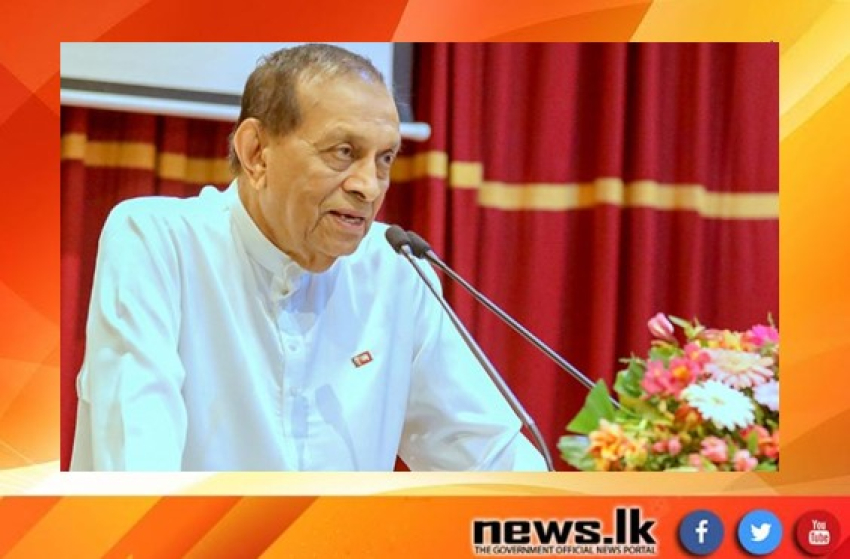President Ranil Wickramasinghe in a message on the birth anniversary of the late President J,R. Jayawardena said if Sri Lanka had been able to sustain the socio-economic reforms initiated by Mr. Jayawardena in 1977, the nation would be a developed country today. President Wickremesinghe conveyed this sentiment on the occasion of Mr. Jayawardena’s 117th birth anniversary, while he is currently on an official visit to the United States of America to attend the 78th session of the United Nations General Assembly.
During the late President’s birth anniversary commemoration held today at the Jayawardene Center in Colombo 07, former speaker Mr. Karu Jayasuriya delivered the keynote address. The President’s message was presented by Mrs. Chamika Mummullage, Senior Assistant Secretary to the President, highlighting Mr. J. R. Jayawardene’s revolutionary impact on the nation’s socio-economic landscape. President Wickremesinghe emphasized that challenges such as riots, terrorism and a failure to fully grasp the philosophy hindered the complete success of these reforms. He also noted that neighbouring countries like India, China and Vietnam, which transitioned from closed and socialist economic practices, studied Mr. Jayawardene’s approach and prospered by adapting their policies to the changing times.
J. R. Jayawardena embarked on his political journey in 1938 as an active member of the Sri Lanka Congress Party. In 1946, he switched his allegiance to the United National Party and assumed the role of Finance Minister in Sri Lanka’s inaugural cabinet. Following the passing of Prime Minister Dudley Senanayake in 1973, J. R. Jayawardena assumed leadership of the United National Party.
In the 1977 elections, J. R. Jayawardena was elected as the Prime Minister of Sri Lanka. During his tenure, he introduced the executive presidential system through a national constitution. In 1978, he became the first Executive President and relocated to Jayawardenapura, the legislative capital of Colombo. He dedicated his life to advancing social justice, promoting culture, education and fostering economic development in Sri Lanka.
Furthermore, President Jayawardena’s political and economic reforms played a pivotal role in modernizing Sri Lanka’s social system, transforming it into a modern state. His significant contributions extended beyond national borders as he served as the sixth Secretary-General of the Non-Aligned Movement, leaving an indelible mark on the international stage.
On this 117th commemoration of Mr. Jayawardena, let us honour his noble social mission for the country. I extend my heartfelt gratitude to all those, including the Secretary-General of the Jayawardena Centre, who has been instrumental in preserving his legacy.
Former Speaker Karu Jayasuriya said;
As an impartial observer, I am delighted to partake in this occasion today.
J.R. firmly believed in the privatization of financially struggling public institutions, a vision championed by Mr. Jayawardena. He also advocated for the reevaluation of these institutions. Furthermore, he emphasized the importance of collaboration between government and private entities to create job opportunities for the nation’s youth, a model exemplified by China’s economic success through such joint ventures.
At certain junctures, the executive presidential system had the authority to appoint and dismiss leaders of the nation. Mr. Jayawardena was known for his resolute decision-making, rarely altering his choices unless compelled by populist pressures.
The Japanese people hold Mr. Jayawardena in high esteem, as he once represented Japan on the international stage. His leadership during his tenure fostered a cadre of talented young individuals, empowering them to contribute to the country’s progress.
Moreover, Mr. Jayawardena significantly advanced the education sector in Sri Lanka, showcasing exemplary leadership qualities that serve as a model for contemporary political leaders.
Despite his dedicated service to the people, JR remained humble, eschewing personal fame. He was also the architect of the Colombo Plan, a testament to his visionary leadership.
During his tenure, Sri Lanka achieved notable milestones in healthcare, transportation and infrastructure development, including the establishment of hydroelectric power plants.
His adept diplomacy with foreign nations greatly benefited the country, fostering stronger trade relations worldwide, particularly through the Colombo Plan.
JR is remembered as a prominent leader and we pay our respects to Mr. Jayawardena for his remarkable contributions to our nation.
The Governing Board Member of the JR Jayawardena Center, his senior grandson Mr. Pradeep Jayawardena;
This commemorative ceremony is taking place today during a challenging period in the country, as we actively seek solutions to the ongoing crisis.
Some segments of our society attribute the current situation to the executive presidential system. However, it’s worth noting that, with the exception of one administration, all previous governments successfully completed their terms due to the executive presidential system. This system played a pivotal role in bringing an end to the northern conflict and maintaining stability in the country.
The present government has demonstrated its commitment to addressing numerous challenges facing our nation. We commend President Ranil Wickremesinghe for his resolute decisions in this regard.
We wholeheartedly endorse President Ranil Wickremesinghe’s agenda for nation-building. As he holds executive authority, it is imperative that the President receives the support of all citizens to propel our country forward.
This event was attended by esteemed individuals including Speaker Mahinda Yapa Abeywardena, Minister Bandula Gunawardena,
Sabaragamuwa Provincial Governor Naveen Dissanayake, Member of Parliament Tissa Attanayake, Former Minister Ravi Karunanayake, UNP Policy and Research Committee Chairman Karunasena Kodithuvakku, JR Jayawardena’s grandson Rukshan Jayawardena, Amrik Jayawardena, Presidential Liaison Secretary A. P. Dayaratne, Senior Professor U. G. Puswewala and members of the Jayawardena Center, as well as family members and other distinguished attendees.




















